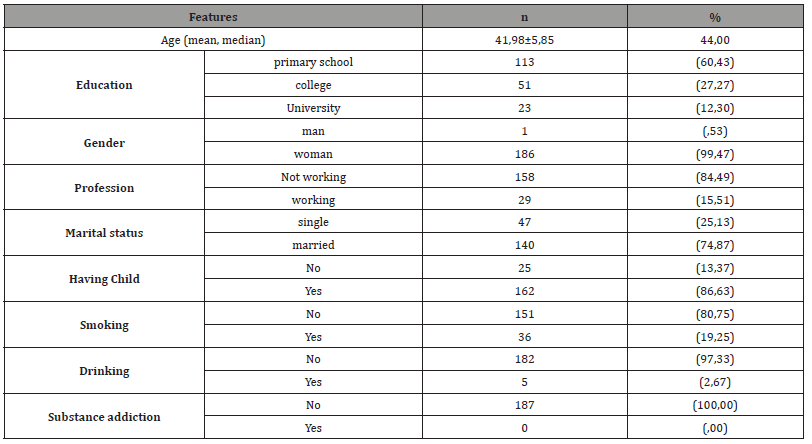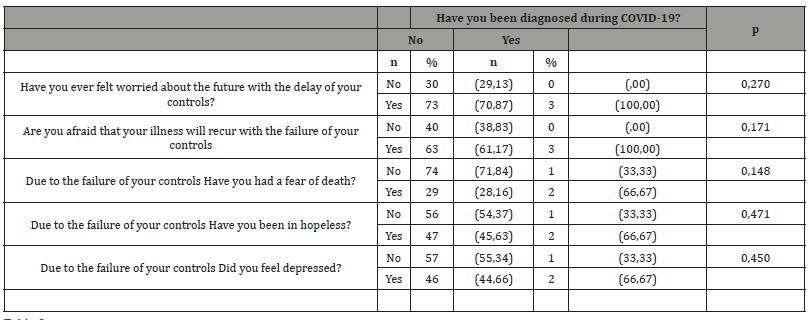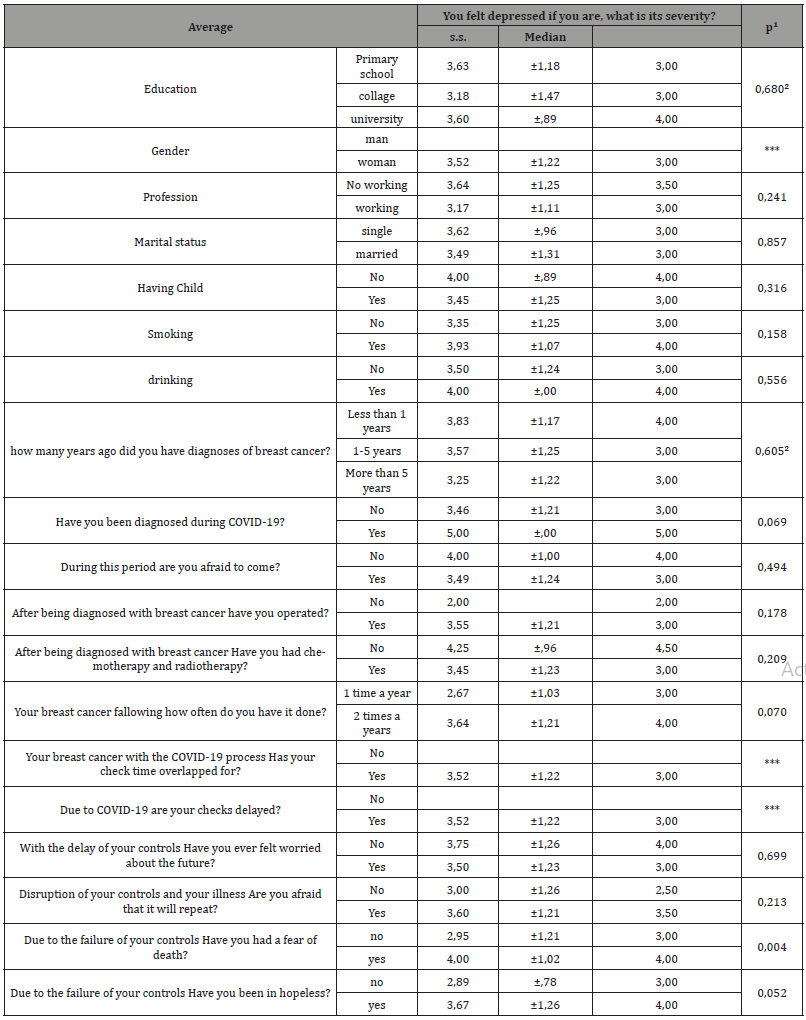Authored by Didem Trablus*,
Abstract
Follow-up of breast cancer patients was interrupted due to inadequate health services caused by the coronavirus pandemic (Covid -19). We wanted to investigate the psychological effects of these interruptions in patient care, such as emotional stress, health anxiety, and depressive states.
Methods: Our study was conducted by applying a 27-question online questionnaire to 187 volunteer breast cancer patients followed at the breast outpatient clinic of our hospital, which has been transformed into one of the most complete pandemic hospitals. The questionnaire consisted of two parts. The questionnaire consisted of the first part with a consent form and sociodemographic data and the second part. Approval by the ethics committee (Approval nº: 2445/2020).
Results:The rate of delayed breast cancer control visits due to COVID-19 was lower in patients diagnosed within one year than those diagnosed more than 1 year ago (eg, 1-5 years, before 5 years). The mean severity score of feeling depressed was 3.52 ± 1.22 out of 5. The depression score was significantly higher among those who felt fear of death because they could not go to its control and those who did not.
Results:The rate of delayed breast cancer control visits due to COVID-19 was lower in patients diagnosed within one year than those diagnosed more than 1 year ago (eg, 1-5 years, before 5 years). The mean severity score of feeling depressed was 3.52 ± 1.22 out of 5. The depression score was significantly higher among those who felt fear of death because they could not go to its control and those who did not.
Keywords: Breast cancer; Depression; Hopeless; Covid-19
Introduction
The COVID-19 pandemic, defined as severe acute respiratory syndrome and associated with coronavirus-2 (SARS-CoV-2), quickly became an historical event as a pandemic in 2020. More than 1,000,000 confirmed cases of infection and more than 66,000 COVID-19 deaths were reported worldwide at the beginning of April 2020 [1]. The most common symptoms are persistent cough and/or new-onset fever of 37.8°C. Common pain and anosmia are also common symptoms [2]. Severe respiratory distress develops in five percent of patients while most patients do not have symptoms. There are 105,394,301 confirmed cases worldwide due to the COVID-19 outbreak as of February 7, 2021 [3]. The total number of cases was reported as 2,531,456 in the data of the Ministry of Health of Turkey on the same date [4]. The main routes of transmission of COVID-19 are respiratory droplets and close contact. Especially healthcare professionals have been the most affected group during the pandemic period. Cancer patients apart from this group are also affected. The disease is associated with increased mortality in elderly patients and patients with chronic diseases, including cancer, and the risk of poor prognosis is around 2-10% [5]. It is predicted that treatments such as chemotherapy or surgery of cancer patients are more susceptible to infection than non-cancerous individuals due to their systemic immunosuppressive status; therefore, these patients may also be at high risk for COVID-19 and may be associated with a worse prognosis [6]. Breast cancer is the most common cancer among women and is the leading cause of cancer deaths. It is responsible for 33% of all cancers seen in women and 20% of cancer-related deaths. It ranks second after lung cancer in cancer-related deaths [7]. The incidence of breast cancer in Turkey is 46.8 per 100,000 according to the information received from the Ministry of Health. Nearly 17,000 women are diagnosed with breast cancer every year. The age range of women who are frequently diagnosed with breast cancer in Turkey is between 50-69 years of age [8]. Breast cancer is a type of cancer that can cause the most psychiatric complaints among the cancers seen in women due to organ loss and physical ugliness caused by surgery and social and sexual inadequacy caused by medical treatments. Patients with breast cancer are expected to significantly affect due to the negative consequences caused by coronavirus disease (COVID-19) and disruptions in cancer treatment. Another important point is the emotional stress and anxiety burden of COVID-19 that can affect the quality of life in women with breast cancer. The disruption of the follow-ups of breast cancer is very challenging for patients due to both the fear of SARS COV-2 infection and the quarantine measures taken throughout Turkey. In this study we aimed to investigate the emotional stress and health concerns of breast cancer patients due to the disruptions of their follow-ups and treatments during the COVID-19 pandemic in Istanbul Training and Research Hospital Breast Unit.
Methods
We planned to investigate the emotional stress and health anxiety caused by disruptions in follow-up and treatments during COVID-19 pandemic process on in breast cancer patients who had been followed-up and treated for breast cancer. For this purpose, the questionnaires applied electronically were evaluated. This study was conducted between March 2020 and June 2020 with 187 volunteer breast cancer patients who are followed up in breast unit of University of Health Sciences Istanbul Education and Research Hospital which has been working as one of the highest capacity hospitals for COVİD-19 pandemic in Istanbul the largest province of Turkey. This study was conducted using an online questionnaire due to the restriction measures implemented across the country in March. The questionnaire consisted of two parts: the first part, online informed consent and basic socio-demographic information, and the second, the situation-related questions. The data were collected by the researchers. Approval was obtained from both the Ministry of Health and the hospital ethics committee and scientific committee for the study. Participants filled the questionnaire online on the screen. The socio-demographic data form included the age, education level, marital status, number of children, alcoholcigarette- substance use status, and occupational status of the patients. In the second part of the questionnaire, how long ago the patients were diagnosed with breast cancer, whether the treatment was interrupted or not, if it was disrupted, the anxiety about the recurrence of the disease and the interruption of the treatment, whether the person had depressive feelings and general health concerns were questioned.
Statistical Analysis
SPSS version 17.0 program was used for statistical analysis. The compliance of the variables to normal distribution was examined using histogram graphics and Kolmogorov-Smirnov test. Mean, standard deviation, and median values were used to present descriptive analyses. Categorical variables were compared using the Pearson Chi-Square Test. The Mann-Whitney U Test was used to evaluate variables between two groups that did not normally distributed (nonparametric), and the Kruskal Wallis Test was used to evaluate variables between more than two groups. P-value less than 0.05 were considered statistically significant.
Results
A total of 187 female breast cancer patients participated in the study. The median age of the patients was 44 and their mean age was 41.98 ± 5.85 years. Of the patients 140 were married, 162 had children, 36 were smokers, and 5 were drinking alcohol (Table 1).
Table 1:Socio-demographic information of breast cancer patients.

There were 33 women who had been diagnosed with breast cancer less than 1 year period, 5 women diagnosed during COVID- 19pandemic, 159 women were afraid of coming to the hospital during pandemic, 177 women had surgery due to breast cancer, 172 women received chemotherapy and radiotherapy after breast cancer diagnosis, and 513 people had gone to hospitals for breast cancer checks twice a year. There were 138 patients whose control time for breast cancer coincided with the COVID-19 pandemic process, 106 patients whose controls were postponed due to COVID-19, 76 patients who felt anxiety about the future due to postponements of their controls, 66 patients had fear that their disease will recur due to disruption of their controls, 31 patients had fear to die due to the delay of their controls, 49 patients were suffering from despair due to disruption of their controls, 48 people were feeling depressed due to the failures in their follow-ups. The average depression severity score of patients who felt depressed were 3.52 ± 1.22 out of 5. The rate of delaying controls due to COVID-19 was lower in those who had breast cancer diagnose in less than 1 year than those who had the diagnose more than 1 year ago. The rate of postponement of controls due to COVID-19 was higher in patients who were afraid of coming to the hospital during the pandemic period than who were not, those who had breast cancer controls twice a year than others and those whose control time for breast cancer was coincided with the COVID-19 process than whose control time wasn’t. No significant difference was found between diagnosis during COVID-19 and feeling anxiety about future, getting fear of disease recurrence, having death fear, feeling hopelessness, and feeling depressed due to the postponement of controls (Table 2).
The severity score of feeling depressed was higher in those who had fear of death than who had not due to the disruption of controls (Table 3).
Table2 :

Table 3:

Discussion
In this study, we aimed to investigate emotional stress of breast cancer patients caused by the delays of follow-ups due to the situation caused by COVİD-19 pandemic not only in Turkey but all over the world.
Oncology patients are a very vulnerable community. Mortality rates due to COVID-19 in cancer patients are 10 times higher than in the general population [9]. This may cause fear of coronavirus in patients and may affect cancer patients’ attitudes towards cancer treatment [10]. In our study, the rate of postponement of controls due to COVID-19 was lower in patients with diagnosed less than 1 year ago than those with diagnosed 1 to 5 years ago and more than 5 years ago (p> 0.001). The rate of delaying their controls due to COVID-19 were higher in patients who were afraid of coming to the hospital during this pandemic period than those who did not, in patients who had breast cancer check-ups twice a year than who had not and those who did not have coincidence of COVID-19 pandemic period and check-up time for breast cancer than who had time overlaps (p> 0.001). The reason for this may be the emotional stress that develops due to COVID and the fear that develops as a result. The high mortality and morbidity of the COVID-19 outbreak and quarantine measures have created fear, anxiety and trauma in the community [11]. For these reasons, there are ongoing studies to measure the stress and anxiety caused by COVID-19 in communities. There is a study evaluating the fears and approaches of young cancer patients (ages 14-21) about COVID-19. Similar to our study, there are studies reporting significant fears [12]. In another study in which 446 cancer patients were studied, a significant number of cancer patients were found to have a significant degree of fear and negative thoughts, just like our study [13]. In a study conducted by Qian et al. it was reported that more than half of cancer patients had anxiety, depression, or fear associated with COVID-19 during the COVID-19 outbreak [14]. Similarly, the Dutch study reported that most patients were concerned about the impact of the COVID-19 pandemic on treatment and follow-up [15]. In our study, high depression and anxiety scores were found in breast cancer patients whose controls were delayed (p> 0.001). There was no difference in depression scores between the groups with and without delayed controls due to COVID-19, this might be due to the high rate of depression feelings in both groups (p> 0.001). This study has some limitations. First since it is a survey and not a face to face interview, we might not be able to get the accurate feelings of patients. Second since it is a survey study again, we are not sure whether the questionnaire was answered by the patients or their acquaintances. Finally, since we didn’t study on how advanced the patients’ disease are, maybe patients who had advanced disease such as metastatic disease might have felt worse than who had less advanced disease.
Conclusion
As conclusion, the quarantine process due to COVID-19 pandemic has created a trauma effect and caused fear effect on cancer patients not to go for routine cancer controls. This situation increased emotional stress and the level of feeling depressed and worrying about the recurrence of cancer. It would be beneficial to increase motivational approaches with social media and to provide accurate information about COVID-19.
To read more about this article...Open access Journal of Advances in Cancer Research & Clinical Imaging
Please follow the URL to access more information about this article
https://irispublishers.com/acrci/fulltext/Emotional-Stress-and-Health-Concerns-Caused-by-Follow-Up-Delay-due-to-Covid-19-Pandemic-in-Patients-with-Breast-Cancer.ID.000561.phpTo know more about our Journals...Iris Publishers





No comments:
Post a Comment